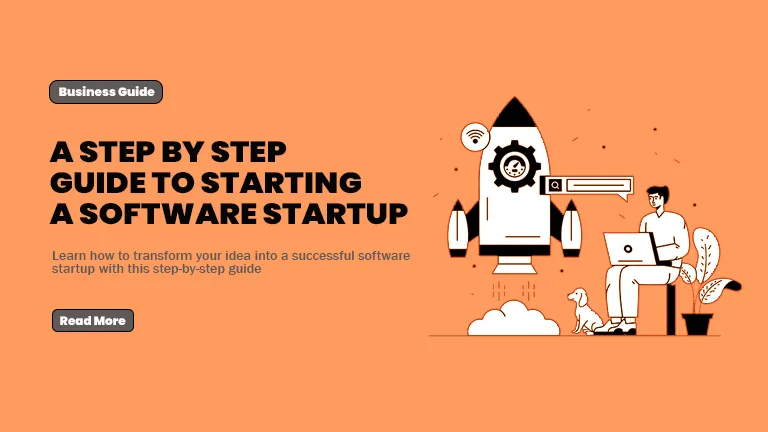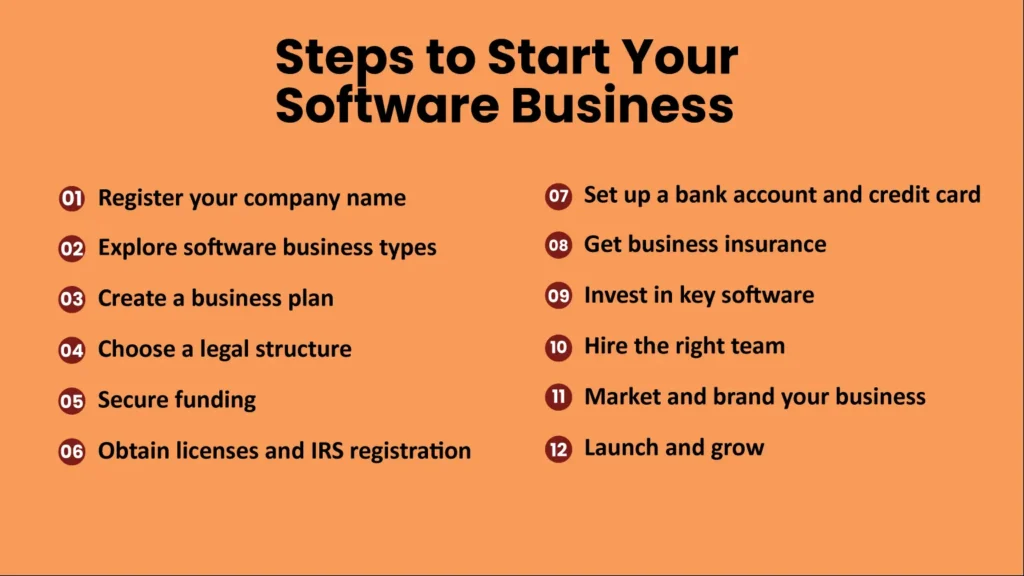A step by step guide to starting a software startup(From Idea to Launch)

If you are thinking of starting your own software business- the idea is absolutely amazing.
But there are a few reality checks along the way, particularly when you start to turn this dream into reality.
The endless work to do, sleepless nights, and constant worrying about each milestone you cover may overwhelm you at the moment.
Relax, you are not the first one.
Every business comes with challenges and uncertainties.
We have your back to ensure you get the best tips and suggestions in our following step by step guide to starting a software startup.
From validating your idea and creating a strong business plan to having an ideal team and finally launching your product, we’ll cover every point you need to know.
So, let’s not waste more time reading about how to get the best start for your ideal software business!
Steps to Start Your Software Startup

1.Get a Name for your Company and Register it.
You have already decided to start a software business; choosing the right name is the first step.
Don’t consider it just a name- it would be your brand’s identity.
Go for a name which shows what are your preferences or goals, or conveys any special message or memory.
Following are some tips you can rely on in selecting a name:
- Make it simple: best of names in business are very short, unique and easy to keep in mind- check some potential businesses’ names to have an idea.
- Availability: Often, businesses prefer to have an ideal name, but when they look for it- whoops, already taken, so always have 2-3 options in this regard. When you are done choosing a name, get the domain ASAP.
- Plan to Market: Your chosen name must reflect your brand’s story and what it aims to offer.
2. Types of Software Businesses to Consider
You have two routes to choose before deciding on the type of services your business would offer.
- Services-Based Software Company
- Product Based Company
In the first one, your business would show the knowledge and skills regarding the software and offer services like IBM or Accenture.
Later, one deals with selling products, like Facebook and Google do.
Both approaches are profitable, although looking for both businesses’ pros and cons is advised.
3. Form a Solid Business Plan
Once you have chosen a name and type of business, it’s time to create a roadmap for your company.
Your business plan can be based on an efficacious strategy, a way to secure funding, achieving expected objectives.
However, we are going to discuss a few essential pillars of a business plan to help you in regard:
- Overview and Summary: This section explains your whole business, including its history, mission statement, values, and even the details like employees, leadership, and operational services.
- Detailed Analysis: You can share a few relevant and essential pieces of information regarding the software industry by conducting research and learning about trends in the market.
- Demographics: This portion will cover the details of your target audience and the demographics.
- Analyzing your Competitors: You should also write about who your competitors are and how to edge over them.
- Operations and Marketing: This is the most critical section of all. Write about the secret strategy to attract potential customers and also your marketing campaigns that address the 4Ps: Product, Prices, Place, and Promotions.
- Financial Situation: In this section, the cost estimations of your company’s operations are noted. It includes development, staffing, manufacturing, marketing, and other relevant expenses.
4. Decide a Legal Structure for the Company
Choosing a legal structure for your company is also a very important step.
It is basically done to make sure your company is registered under the law of state/country where you operate it.
There are a couple of legal options you may consider to go with:
- Sole Proprietorship
This one is chosen when you are the only owner of your business and accountable for all kinds of debts, obligations, and operations
- Partnerships
It is the most famous one among young entrepreneurs. It’s required that two or more than two like minded people are involved in business as partners.
- LLC (Limited Liability Company
LLC is a hybrid business structure chosen to protect the owner from the company’s personal responsibilities, such as debts and other liabilities. Businesses who choose this can have one or multiple owners.
5. Getting Funding for the Company
Securing funding for your business is the most important step yet the most difficult one. Especially if the required amount is more than your credit.
You can also look for business funding by considering:
- Accelerator programs
- Crowdfunding
- Bank loans
- Personal savings
- Angel investors card financing, etc.
But remember to discuss the plan with your company’s financial advisor to go for the suitable option
6. Seek Business License, Permit, and IRS
The next step is to get a license to operate your company legally.
Then, as per your company’s location, you have to register with local, state and federal govs, as they might vary by the requirements.
These are the few documents that you must prepared to register:
- Article of incorporation and operating agreements
One of the legal requirements for businesses is to locate and register with the government to be accredited to operate legally.
However, for the business to qualify, the company must produce an article of incorporation document that outlines the name of the business, the structure of the business, and the purpose of the business, among other important information about the business.
- Employer Identification Number (EIN)
After registering your business with the government, you must next register your software business with the Internal Revenue Service (IRS), which will issue an Employer Identification Number (EIN) that you will need if you wish to open a business account in a bank.
- Sales Tax License
Sales tax will be collected, and your software company will remit it depending on the location.
This may be different according to the state, and you need to find out more about the fee structure to get a sales tax license.
A sales tax license entails going to a state revenue department and getting a registration, and if you want to sell/provide services, you go for a seller’s permit.
7. Get a Bank Account and Credit Card
Actually, opening a bank account in the name of your software company is quite easy, and the following are the steps:
- Select and complete all the options with the bank.
- The applicant should ensure she submits all documents accompanying the application form, such as the software company’s incorporation article, address proof, government ID cards, social security number, etc.
- Discuss the needs of the business and establish a sound relationship with the bank.
- Finally, organizations should take time and visit the nearest bank or a credit card company to fill out an application for a business credit card.
Some of the things you need to provide include your business and personal information, and you can use a business credit card to make business purchases.
Moreover, good credit records would enable your business to obtain loans and future credits.
8. Choose the Right Business Insurance for the Company
If you’re about to launch your business, it’s important to purchase the right insurance.
It helps you tackle unexpected circumstances, such as vandalism, theft, and property disputes.
Moreover, in some cases your company can face customer lawsuits and therefore you have to make sure that your business is well protected.
9. Purchase the Right Software for your Software Startup
To run a business, you need certain things to make things easier for you.
Therefore, purchasing software can be the right thing to do.
It assists you in delivering services for your customers. Third-party suppliers or software operators help you run your business, from in-house operations to human resources, to tackle the hardware support your project needs.
But the question is, which software can you choose to make your business more effective?
Before we proceed, we will choose the right software or equipment.
It’s necessary to mention that those software service providers can have access to your critical data.
Therefore, we advise you to finalize vendors that you can put faith in and that are trustworthy in the market.
If you have a business that operates in a design domain, You need licensed software.
If you are an operating biz, you need software like Asana and HubSpot, etc. Hence, find the right vendor who can help you function biz properly.
10. Right Hiring Makes the Difference
If you have a brilliant idea and a budget but have yet to hire a workforce that can bring all her experience, Chances are that you will face failure.
It’s critical to understand what your biz needs, a remote worker, permanent or part-timers, freelancers, or you need outsourcing.
As a founder, the first thing your company needs is experience, which you can only bring by hiring a team of talented, skilled, and devoted professionals.
Try out free resources like LinkedIn to network with like-minded people.
Keep an eye on what they share so that, as a founder, you may need them to build your biz from scratch.
If you have a budget to pay a nominal percentage on Upwork and Fiverr, you can certainly outsource your work to freelancers.
While hiring the right professional, make sure you check his skill set, prior knowledge about the role, and last but not least, ability to show up every time.
11. Branding and Marketing For Your Business
If you enter the market with proper marketing and branding, chances are that you will fail, and here is why:
– People rarely trust new businesses.
– Customers are more loyal to what they’re already using.
– Without educating your customers about the product, you will fail to convert them.
– Your customer acquisition cost will remain high, resulting in burning the money you gathered from investors.
– People will fail to remember your product.
To avoid this helplessness, here are a couple of things you need.
A Website Aligning With Your Brand: If you have a boring site, forget about converting customers you will bring from Meta or TikTok ads.
Therefore, design a website that offers unique products related to your niche, easy-to-order options, and works well on mobile.
If you have a website that lacks a modern feel, your conversions will be significantly less.
- Bring Your Brand to Life With Social Media Management: As we concluded, if you are a new business and are struggling to educate customers through ads,
You certainly need a strong online presence. Social media helps you spread your brand message to your potential customers.
Since posting on any of those platforms doesn’t cost you anything but a social media manager (which you can outsource).
Your customer acquisition cost will drop significantly.
- A Well Defined Logo: Choose colors and fonts which advocate for your biz. Imagine, using green colors for the Hindu website.
Therefore, pick the right selection of colors to differentiate your logo from what is already available in the market.
- Best CRM Solutions: You certainly need to invest in the right CRM solutions to educate your potential customers.
If you have a house painting business, you will need to educate customers about topics like:
– How to check if the paint will last longer than 10 years.
– How to brush on surfaces that are prone to moisture.
– How do you adequately mix paint with oils?
Creating digital content on TikTok and Instagram can certainly help you maintain business authority. You can’t achieve this without a marketing plan.
Therefore, build a CRM, as it helps you store customers’ data so that you can convert them by sending necessary emails or showing them ads about your product.
12. Launch and Grow your Business
It is the moment to start your company officially.
Once you have done what has been said before in this step by step guide to starting a software startup, you are in the right standing to establish a successful business.
Nevertheless, the launch and the first sales are the first step forward on the great race track.
That means that to make profits and stay afloat, one has to expand, which is a time-consuming affair and requires effort.
Partner with companies that have legal business and chart with other firms to find projects to share or to offer services.
Final Words
Now, that you’ve got enough knowledge to start a business in this Step by step guide to starting a software startup.
If you still have any confusion regarding any of the discussed steps or wanna ask something else regarding the process, Reliable Startup is here to hear and solve your issues.
Contact us without hesitation and make the first move towards your software startup business.
Stay tuned with us for more insights like this!






